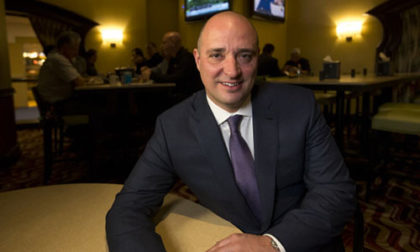Las Vegas Poker Dealer Loses License After Toke-Padding Episodes
A recent episode reminds poker players that in cash game, it’s not sufficent to keep one’s eyes on the other players; one has to monitor the dealer as well. Late last week, the Nevada Gaming Commission voted 4-0 to revoke the gaming license of Jesus Saucedo, a poker dealer who was found to have illegally and surreptitiously slid chips from a live pot into the dealer’s toke (gratuity box) at Bally’s tables.
Saucedo had been removed from his job at Bally’s after one of his chip-sliding moves was noticed on security footage last June, after which the casino reviewed more footage and discovered at least two other incidents. Each was a small-scale theft involving just a $5 chip, but it was nonetheless illegal under Nevada law.
 However, the rare evidentiary hearing was called after Saucedo gained employment at the nearby Bellagio. At some point the previous incidents at Bally’s became more public knowledge, and the hearing was called. Unstated in the initial story on the hearing published by the Las Vegas Review-Journal a couple of days ago was how Saucedo had retained his license until that point. That feature noted that Saucedo had voluntarily resigned at Bally’s after the incidents were uncovered, though that may have been with a tacit understanding that he not seek similar employment at other Nevada casinos. Nonetheless, and despite the small scale of the toke-grabbing, such activity is usually dealt with very strictly when uncovered.
However, the rare evidentiary hearing was called after Saucedo gained employment at the nearby Bellagio. At some point the previous incidents at Bally’s became more public knowledge, and the hearing was called. Unstated in the initial story on the hearing published by the Las Vegas Review-Journal a couple of days ago was how Saucedo had retained his license until that point. That feature noted that Saucedo had voluntarily resigned at Bally’s after the incidents were uncovered, though that may have been with a tacit understanding that he not seek similar employment at other Nevada casinos. Nonetheless, and despite the small scale of the toke-grabbing, such activity is usually dealt with very strictly when uncovered.
Saucedo disputed at least one of the theft claims during the evidentiary hearing. However, those claims didn’t fly with the NGC. “I think you cheated the game,” Commissioner John Moran Jr. told Saucedo during the hearing, as reported by the LVRJ. “I think you cheated your employer and, consequently, you cheated yourself because I think you’re a very skilled and good employee except for the fact that you cheated. … I don’t think this was your first rodeo. I think you’ve been doing this a long time. I wish we had facts for that, but we don’t, but I don’t need anything else than your admission and what I saw on the affidavits. I’m going to believe what I saw.”
Saucedo had been suspended by his current employer, the Bellagio, and was terminated shortly thereafter. The dealer is allowed to reapply for a license after a 12-month period.
Unfortunately, such thefts by dealers aren’t as isolated an occurrence as the recent story might lead casual players to believe. Most casinos go through strict protocols designed to prevent dealers from pocketing chips, which have led to some ingenious schemes being devised as a result.
One of the most infamous of those episodes occurred back in 2009, when a high-stakes dealer was caught having pocketed two $1,000 chips from a nosebleed game in the Bellagio’s famed Bobby’s Room. According to famed “Big Game” participant Barry Greenstein, the dealer had secreted a small “hold out” device inside his shirt’s sleeve, allowing him to evade detection by the room’s security cameras while showing the traditional empty palms after pushing the pot.
In this instance, however, the breakdown of a split pot during what was normally a one-winner game led to the discovery of the missing chips. Cheating dealers generally know to avoid attempting to steal chips during normal split-pot games or during fixed-limit games, when it’s generally easy to determine how many chips should be in the pot.
As with the current episode, the casino then reviewed older security footage involving the dealer, named “Tony,” and discovered similar thefts. Given the complexity of the method, it’s likely that that dealer pocketed many thousands of dollars in chips stolen from the Bellagio’s tables.
Such theft tends to be even more rampant at games featuring little or no formal governance, including underground games, charity games and the like. Such games have, historically, turned out to be ripe for the picking by stealing dealers over the years. These tales are everywhere, though in less-regulated games, they rarely result in formal prosecution. Nonetheless, they serve as reminders that cash-game players must remain diligent, no matter what the surroundings.




















COMMENTS